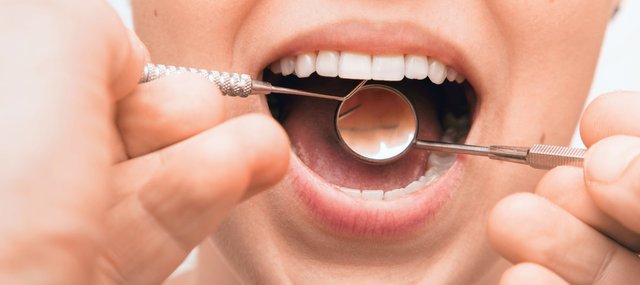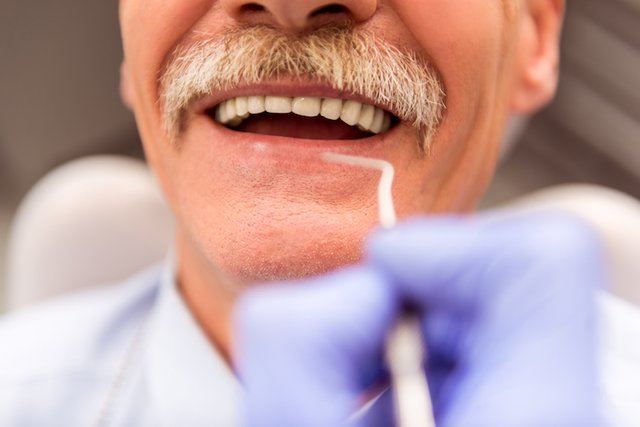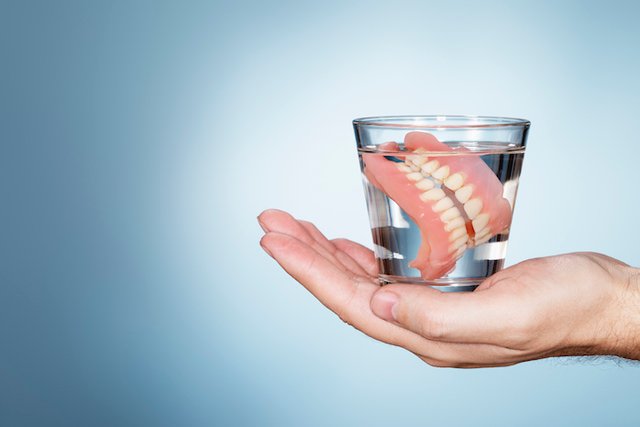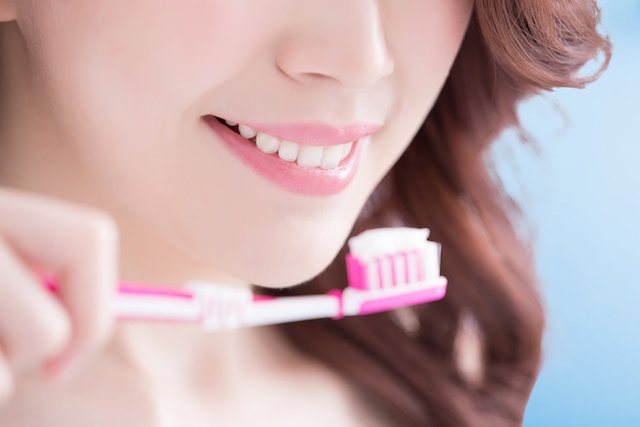Tooth Loss May Increase Your Risk of Dementia by Up to 80%

Introduction
I came across an interesting open access study today which suggests that the fewer teeth that people have, the greater the risk they have of developing all types of dementia.
The study is by Takeuchi et al [1] and is available to read and download here for free.
Dementias in general are a growing problem worldwide, as the authors state in their introduction:
"Approximately 46.8 million people worldwide have dementia, and the incidence is 9.9 million per year. The number of people living with dementia will nearly double every 20 years."
Ideally we would like to find a cure but it is also useful to know what risk factors can modify the risk of developing them.
That way we can at least attempt to reduce the risks by educating people and providing adequate support.
With a rapidly ageing population this could make a significant difference.
Design

This was a prospective cohort study. That means that it takes a sample of a particular population and follows them up over time to see if they develop a disease.
In this case 1566 Japanese adults aged over 60 (who did not have dementia) were followed up for 5 years to see whether there was any association between how many teeth they had and developing dementia.
They were divided up into four groups corresponding to different numbers of teeth/tooth health at the start of the study and the classification was carried out by dentists.
Results

The rate for development of all types of dementia in the group was 11.5%.
In all cases having less than twenty teeth significantly increased the risk of developing dementia (1.62-1.81 times higher).
Interestingly the rate for those with one to nine teeth was highest of all the groups (1.81) and higher than that for those with no teeth (1.63)
(NB - I will discuss this issue further in the "Discussions and Limitations Section".)
Looking at the specific dementia subtypes here, the association with Alzheimers disease reached statistical significance (p 0.08) but Vascular dementia did not (p 0.20).
This likely reflects the significantly lower number of VD cases vs AD (42 vs 127).
So what could be the mechanism for the increased risk?
Possible Mechanisms

There are 3 main mechanisms that have been suggested:
The activity of chewing has been suggested to increase blood flow within the brain and protect against dementia.
Nutritional deficiency or dietary changes due to the inability to chew adequately may also contribute.
Chronic inflammation linked to disease of the teeth and gums may contribute to dementia.
Obviously all of the above factors may interact to increase the risk.
Discussion and Problems
As always there are multiple points we need to consider here:

Sample Size
The sample size here at 1566 subjects, whilst not tiny, could as always be bigger.
This is actually quite small for a cohort study and so we would ideally want to have larger studies to confirm the results.
Confounding Factors
Although attempts were made to statistically control for confounding factors, it should be borne in mind that no such method is perfect.
Certain confounding factors may be undiagnosed or missed and others may not even be considered because people are unaware they exist.

One to Nine Teeth Anomaly?
Having one to nine teeth has the highest risk for dementia according to the results here.
This would seem strange at first but it is possible that having no teeth may actually be beneficial compared to having just a few.
For example people with no teeth may actually find it easier to wear dentures, or may be able to chew food and eat more effectively than those who have a few remaining natural teeth.
Consistent with this theory denture use was noted to be highest in the no teeth group vs the one to nine teeth group (76.9% vs 69.1%).
It is also possible that the actual groups involved were sufficiently small to create an anomalous blip in the results - replication would help to elaborate this.

Missed Diagnoses
One must consider the possibility that some people in the early stages of dementia may have been missed at the start of the study and so not excluded.
This is important because it may well be that rather than tooth loss causing or contributing to the causation of dementia, it may actually be a result of dementia.
This could potentially skew the results.
The only way to know for sure would be to have some sort of definitive gold standard way to exclude dementias before the onset of symptoms.
We don't have that yet.
Another thing to note is that some people who developed dementia during the study period may have been missed for similar reasons.
This could also skew the results in a slightly different way.
Both these points are suggested by the fact that examining the brain at autopsy was not 100% consistent with the clinical diagnoses:
Of 347 individuals with dementia (including subjects with dementia at baseline) during follow-up, 53 underwent autopsy. Agreement rates between clinical diagnosis and pathological diagnosis were 0.80 for AD and 0.68 for VaD.
This is to be expected.
Not all patients who die are going to be autopsied, it is simply not feasible from a resource stand point.
Clinical diagnosis based on signs and symptoms will never be as accurate as looking at the actual brain tissue under a microscope.
Perhaps some future advanced imaging method will give us a similar level of accuracy but until then this factor must be taken into consideration.
Conclusion

This study suggests that tooth loss is a significant risk factor for the development of dementia (particularly Alzheimer's Disease) in adults over 60.
This implies that improved dental care and oral hygiene based interventions could potentially help to reduce the rates of dementia.
As is often the case further research is needed to confirm the results in larger sample sizes, particularly as the subset with Vascular Dementia was comparatively small and did not reach significance.
Future studies may look at a more detailed breakdown of dementia subtypes and may also help to clarify the role of denture use in disease prevention.
Controlled studies which look specifically at comparing different levels of dental care and dementia risk would also be useful.
Thank you for reading

References
- Takeuchi, Kenji, Tomoyuki Ohara, Michiko Furuta, Toru Takeshita, Yukie Shibata, Jun Hata, Daigo Yoshida, Yoshihisa Yamashita, and Toshiharu Ninomiya. 2017. “Tooth Loss and Risk of Dementia in the Community: The Hisayama Study.” Journal of the American Geriatrics Society, March. doi:10.1111/jgs.14791.
If you like my work please follow me on Steemit: @thecryptofiend & on Twitter : Soul_Eater_43.
All uncredited images are taken from my personal Thinkstock Photography account. More information can be provided on request.
Before you go have you filled in the Coinbase form to list STEEM? It only takes a few seconds. THIS POST shows you how.
Are you new to Steemit and Looking for Answers? - Try:

I just had my first dentist appt in like 20 years. I took a holistic approach because I was concerned about the toxicity of root canals. I had two extractions and the made me feel vastly different. I definitely believe dietary deficiencies can cause tooth loss and dementia
Very possible. We will need to see where the research goes. Thank you for sharing your experience:)
@thecryptofiend very interesting read.
I may agree to this
but .. not because of the factors they gave out there.
Sugar corrodes teeth and not having a proper dental hygiene could also decay and finally make a person loose his/her teeth but I can't really pathom how someone who .. don't eat much sugar and is very active but lost his or her teeth in a boxing fight or an accident have dementia.
Many recent studies conclude and associate dementia as the [diabetes on the brain]I(http://www.diabetesforecast.org/2012/aug/diabetes-on-the-brain.html?referrer=https://www.google.nl/) but if they tell the people this way people will stop eating cookies, cake and ice cream and the sugar companies shall close everyone will live healthy that the pharmaceuticals would close next so they have to tell them this way but it seems the same.
Many old people who are 120+ in Asia lost their teeth to vinegar as it is often used in cooking specially in the Southeast but they are still very aware and their brain functions normal without any sign of dementia specially those who are Buddhist who live on top of the mountains and have no access to any processed food that contains sugar specially.
There may be some common underlying cause that causes both dementia and teeth loss.
Perhaps there is some type of connective tissue abnormality or maybe these people have a particular micro-organism in their mouth which somehow triggers tooth loss. There may be some environmental toxin exposure that triggers both - there are so many possibilities!
It is hard to say without more in depth research to identify the mechanisms.
This study is from Japan where they do use a lot of vinegar too, not sure how it compares to other Asian countries though.
Also I don't think people who are over 100 years old and in good health are a good group for extrapolating to the general population as they are unusual.
@thecryptofiend we use a lot of vinegar .. I forgot to add that some of those who lost their teeth may have lost it from pulling it out and some studies claim that anesthesia could also trigger dementia. Years ago in Asia they just pull the teeth instead of filling it with ceramics or amalgam (this too is a risk hazard) so I can't imagine how many anesthesia a person had to loose all his or her teeth. My cousins already lost all their teeth come to think of it they're even 3 to 10 years younger that I am and yes - they lost it to drinking soda instead of water - and eating a lot of sugared food not to mention the toothpaste in the Philippines also have sugar itself. Nowhere to run for a tooth.
That is still quite controversial though.
Yes sugary and acidic snacks/drinks are bad for you teeth.
Also diabetes and poor control of blood sugar (glycaemic control) may increase the risk of dementia too.
It is one of the confounding variables they tried to reduce the effect of in the study.
@thecryptofiend yes the anesthesia is still not really proven but being taken into consideration indeed. I'm a woman it's hard to say no to desserts :D
Yes and it is still best to avoid if you can.
Hard for me as well to say no!
Thank you for covering the statistical part of this study as well. Too often the statistical measures are not mentioned at all.
I appreciated seeing the p-values but unfortunately they completely invalidate the study in my opinion. A p-value of 0.08 is not statistically significant. The highest p-value I have seen considered statistically significant is 0.05. I personally prefer 0.01. That is influenced by having to prove statistical tests while working on my math degree in college and realizing they are based on multiple layers of assumptions.
You also have to keep in mind that statistical tests say nothing about causation, but can only reveal a probability of correlation. The article seems to imply that losing your teeth is a precursor to dimentia (With a p-value of 0.2 I reject the correlation altogether). However, what if it was some change in body chemistry that would later lead to dimentia that caused tooth loss?
You're welcome. I can only cover the basics though since I am not a statistician! I still come across studies that use methods that I have not even heard of and I have to go and try to figure out what they mean - luckily there are lots of online resources these days to help:)
what a great post - you are really one of the best creators here! did not know this link to dementia yet! Upvoted
Thank you that is very kind. I think it is too early to say this is definite - it is still in the "maybe" camp, and we also don't really have any kind of certainty of the mechanism or direction of causality.
As others have said it could be that there is a common underlying mechanism for tooth loss and dementias (particularly AD) rather than one causing the other.
Thank you for commenting:)
very interesting - my not existing medical knowledge just told me it has to do (losing teeth) with wrong / poor food people eat
Correlation does not equal causation. Isn't it another possibility that people who are more likely to lose their teeth are more likely to get dementia for some related reason?
If the chewing explanation turns out to be true then chewing gum could help prevent dementia! Of course, you would still need your teeth...
Exactly! there are two ways in which a correlation can occur between two variables: either one causes the other or a third one (unknown) is causative of the other two. It could just be that general degeneration causes both of these effects, and that some people simply age faster than others.
Yes.
Very good point that is why I suggest that a controlled study which tests whether maintaining teeth prevents or reduces the risk would be a useful next step.
I was about to suggest something similar. Both dementia and loss of teeth are stuff that are easily connected to ageing people so that it may be not too complicated to find options for a third variable.
Yes.
That's crazy! That reminds me an episode of The Knick, where I learned, to my horror, that the removal of teeth was deemed fit to cure dementia, as far as the 1930's thanks to a notorious doctor Cotton! Check it here: https://www.theatlantic.com/health/archive/2014/10/the-tragic-sadistic-mental-illness-treatment-from-the-knick-is-real/381751/
Very weird - I hadn't heard of that. Thank you for the link!
Thank you for the insight. I work with Dementia patients and with the numbers increasing rapidly here in Ireland (40,000 and rising) at present, any preventative measures whatsoever is a huge bonus. This is such a crippling disease. Very interesting read, Oral care is so important in the elderly also in terms of self-esteem, dignity, nutrition and social integration. win, win.
Absolutely.
Sadly in the UK a lot of elderly people can't afford good oral care due to the high costs of dentistry.
Thanks for sharing your perspective.
Really interesting. I did my diploma thesis on dementia and it was interesting to see how many factors can predict or being related to it. Even though their "possible mechanisms" did not convince me, it would be interesting to see some more studies.
Yes that is always important.
I suspect of their mechanisms, chronic inflammation or nutritional deficiency are more likely but we will need more research to know for sure - it could be something completely different.
The chewing and blood flow hypothesis doesn't really make sense to me but we will have to see.
I am not a scientist or a doctor. But is it possible that people lose their teeth because of other factors like poor diet or lack of money to take care of their teeth (and the rest of their bodies) and dementia would really be related to these other factors? I'm not arguing, this just made go "hmmm".
It's a very good point and entirely possible. Hopefully future studies will look more at the direct causality.
This is the start, once the association is made we first of all need to confirm that it can be repeated.
Once something is shown to be repeatable then we look at elaborating further.
You could try to do it all in one mega study but sadly funds, manpower and the complexity involved mean that it doesn't normally happen that way.
That's a good point. You have to recognize a problem before you can start to solve a problem.
Upvoted. Now, I got to go brush my teeth. :-)
OK, seriously though, my theory then is like to be associated with brushing of teeth. So, perhaps the action of brushing teething is massaging the vital points creating some form of exercise for the brain which could sort of explain the result. Just a wild theory.
You mean in terms of creating some stimulating mental activity ? It is possible but it is hard to be sure without doing further research.
It might be a combination of lots of different things that relate to brushing your teeth or itmight be that whatever underlying processes cause dementia, also make your teeth fall out!
Of course, only research can conclude. Sometimes, I wonder taking out the wisdom tooth make one lose some wisdom. Perhaps, all teeth are some bit of wisdom. hmm....